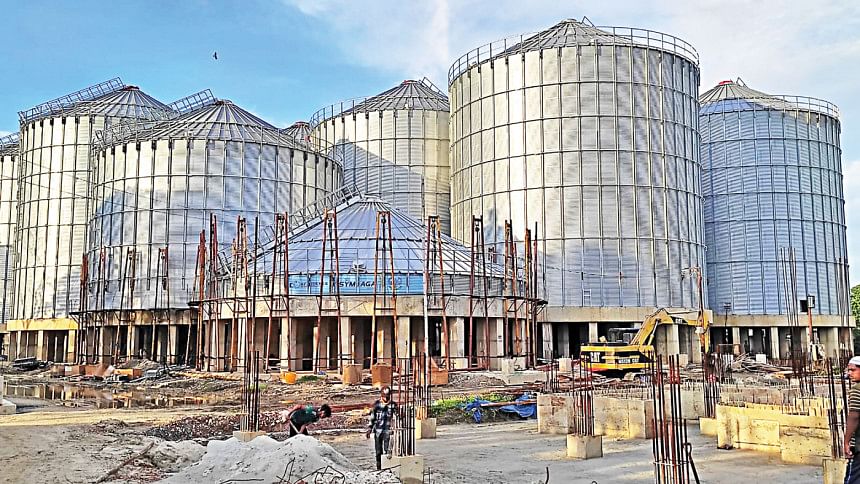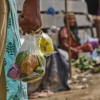Food storage project halfway though a decade has gone by

A government project aiming to enhance food security in Bangladesh has made less than 50 per cent progress even though nearly 10 years have passed since the Tk 3,569 crore initiative began in January 2014.
Under the project, styled "Modern Food Storage Facilities Project", the government planned to establish eight silos across as many districts with two meant for storing wheat while the others would hold rice.
In addition, it was decided that 5 lakh rural households across 63 upazilas would be given small silos for storing food grains that could be sold or consumed during times of scarcity.
Besides, monitoring of the country's overall food stock, including transportation and market supervision, was to be digitalised in a bid to reduce inefficiencies.
However, the silos remain unbuilt while the digitalisation process is similarly untouched due to negligence by the implementing agencies, according to the Implementation Monitoring and Evaluation Division (IMED).
As a result, the project cost has been revised upwards by 86 per cent from Tk 1,920 crore while another two years is being sought for its implementation.
"Although almost 23 months have passed since signing the contract, the software firms have yet to deliver the food stock and market monitoring system," the IMED said in an in-depth report published recently.
Beximco Computers Ltd in collaboration with Tech Mahindra Ltd of India and Tech Valley Networks Ltd of Bangladesh was contracted in June 2021 to develop the digitalisation system at a cost of Tk 261 crore.
As per the contract, the software was to be developed in 12 months while another two years of maintenance would be provided by the companies.
However, the IMED study showed that the contracted companies were not able to develop the software in keeping with the action plan.
"There is uncertainty about whether it will be implemented at all as the developers faced delays in getting the required Systems, Applications and Products (SAP) licence," the IMED said.
Besides, the implementing agencies did not inform the project director's office about such delays even though the contract period had expired.
"In this case, there is negligence on part of the software developers," it added.
The IMED also mentioned that the required hardware was delivered long before, which is not desirable.
The main objective of the "Food Stock and Market Monitoring System" was to digitally connect the Directorate General of Food with all other relevant departments in order to ensure transparency and reliability in food grain procurement.
But just 25 per cent progress has been made so far, the IMED report shows.
Acknowledging the delay, Project Director Md Rezaul Karim Sheikh said they are still unable to complete the software development despite repeatedly warning the implementing firms for missing the deadline.
Sheikh said it usually takes just three months to get an SAP licence but unfortunately, the software developers got it one-and-half years after their application in June.
Monzurul Karim Khan, executive director of Beximco Computers, said they are now developing the software at full speed after getting the required license.
It should be mentioned that the IMED prepared its report before Beximco Computers was granted its SAP license.
Regarding reasons for the delay, Khan said receiving the license through Tech Mahindra took longer than anticipated as they were conducting due diligence, including an internal audit, for securing approval at the time.
"The software has many components, of which two applications have been delivered and are already live," he added.
Khan also blamed the ongoing US dollar shortage for delays in software development.
"The IMED report was prepared according to the progress up till April, but our major developments occurred in the last few months," he said, adding that the work will be complete in a few months if there are no external challenges.
Likewise, the plan for building eight grain silos with a combined storage capacity of 5.35 lakh tonnes remains relatively stagnant as well.
The silos were to be built in strategic locations of Dhaka, Narayanganj, Chattogram, Mymensingh, Tangail, Khulna, Barishal and Brahmanbaria.
Later, the food department cancelled Dhaka's silo, citing issues in selecting the location.
The project was scheduled for completion by June 2020, but overall progress has reached just 50 per cent as of April this year.
And as the food department failed to meet this deadline, the project was revised twice and the cost rose by about 86 per cent.
"There was a loophole in the feasibility study and mistakes in its design," the IMED said.
According to the report, it became known that it is not possible to build the Dhaka silo on the banks of Buriganga river only after roughly Tk 2 crore was already spent.
Asked about delays in construction, Project Director Sheikh said they repeatedly served notices to the contractors, threatening to scrap their contracts if they do not cooperate.
Regarding some of their successes, Sheikh said they have already distributed small-scale "household silos" to five lakh families in 19 flood-prone districts of the country.
Considering the lengthy delays in implementation, the Planning Commission has proposed increasing the project duration until December 2025, subject to approval from the World Bank.


 For all latest news, follow The Daily Star's Google News channel.
For all latest news, follow The Daily Star's Google News channel. 








Comments